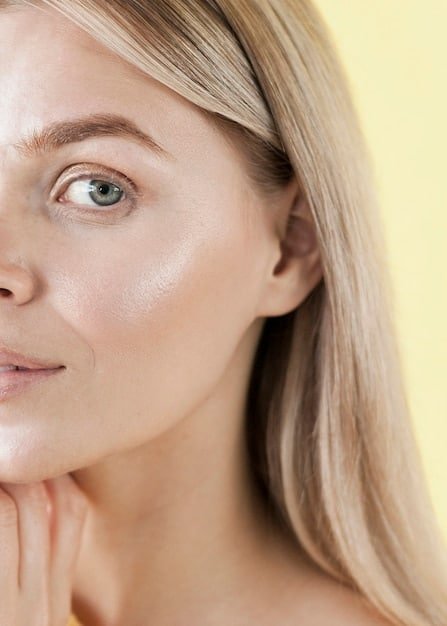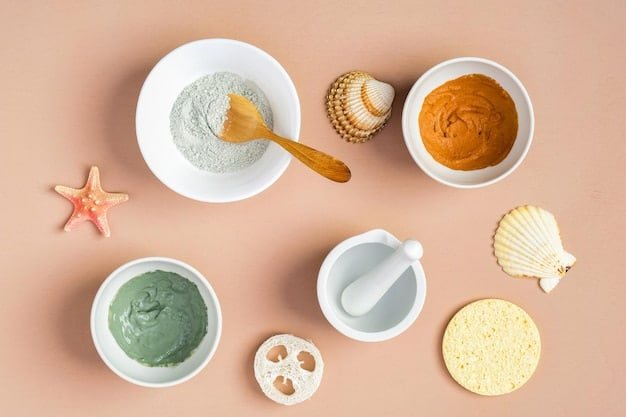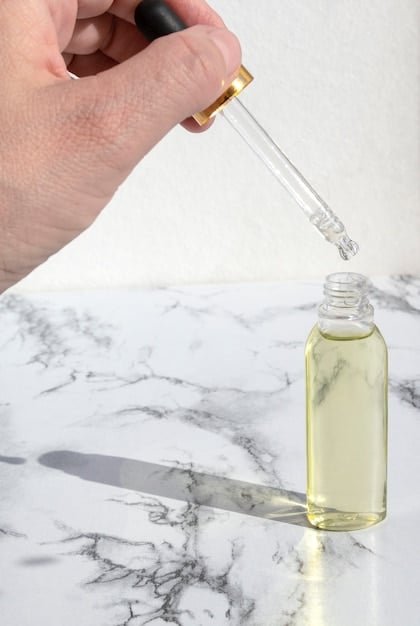Repair Your Damaged Skin Barrier in 4 Weeks: A Complete Guide

Is your skin barrier damaged? Repairing it in four weeks involves gentle cleansing, avoiding harsh exfoliants, and using moisturizers with ceramides and hyaluronic acid to restore hydration and protect the skin.
Are you experiencing redness, irritation, or unusual dryness? You might be asking, is your skin barrier damaged? How to repair it in 4 weeks? Let’s explore how to restore your skin’s natural defense and achieve a healthy, radiant complexion.
Understanding Your Skin Barrier
The skin barrier, also known as the stratum corneum, is the outermost layer of your skin. Think of it as your skin’s bodyguard, protecting you from environmental aggressors and preventing moisture loss.
A compromised skin barrier can lead to a variety of skin issues, making it crucial to understand its importance and how to maintain its health.
What Does the Skin Barrier Do?
The skin barrier plays several vital roles in maintaining overall skin health. It’s not just a passive shield; it’s an active participant in keeping your skin balanced and protected.
- Protects against pollutants and irritants: It acts as a barrier against environmental toxins.
- Retains moisture: Prevents water loss, keeping your skin hydrated.
- Regulates skin pH: Maintains the optimal acidic environment for healthy skin function.
Common Signs of a Damaged Skin Barrier
Recognizing the signs of a damaged skin barrier is the first step toward repairing it. Here are some telltale signs you should watch out for:
- Increased Sensitivity: Skin becomes easily irritated by products or environmental factors.
- Redness and Inflammation: Persistent redness or inflamed patches appear.
- Dryness and Flakiness: Skin feels tight, dry, and may even peel.
- Breakouts: Increased acne or breakouts due to compromised protection.
Understanding the structure and function of the skin barrier is essential for maintaining healthy, resilient skin. By recognizing the signs of damage, you can take proactive steps to restore its integrity and keep your skin looking its best.
Identifying the Culprits: What Damages Your Skin Barrier?
Many factors can contribute to a damaged skin barrier. Identifying these culprits is essential to prevent further harm and begin the repair process.
From harsh skincare ingredients to environmental stressors, many things can weaken your skin’s natural defense.

Over-Exfoliation
While exfoliation can be beneficial, overdoing it can strip the skin of its natural oils and weaken the barrier. Limit exfoliation and choose gentle options.
Harsh Skincare Products
Products containing alcohol, strong fragrances, or sulfates can disrupt the skin’s natural balance. Opt for gentle, fragrance-free alternatives.
Environmental Factors
Exposure to extreme temperatures, UV radiation, and pollution can all damage the skin barrier. Protect your skin with sunscreen and appropriate clothing.
- Sun Exposure: Prolonged exposure without protection can cause significant damage.
- Extreme Weather: Harsh conditions like cold winds or intense heat can compromise the barrier.
- Pollution: Environmental pollutants can penetrate and irritate the skin.
By pinpointing the factors that are harming your skin barrier, you can make informed choices to protect and repair it. Simple adjustments to your skincare routine and lifestyle can make a big difference in maintaining a healthy, resilient complexion.
Week 1: Gentle Cleansing and Hydration
The first week of your skin barrier repair journey is all about gentle cleansing and intense hydration. It’s about providing your skin with the nurturing care it needs to start healing.
Focus on stripping away harsh products and replacing them with soothing, hydrating ingredients that support the skin’s natural recovery process.
Choose a Gentle Cleanser
Opt for a cleanser that is sulfate-free and non-foaming to avoid stripping the skin of its natural oils. Look for ingredients like glycerin or ceramides.
Hydrating Toners and Essences
Incorporate hydrating toners or essences into your routine to replenish moisture after cleansing. These products help prepare your skin for subsequent treatments.
Key Ingredients to Look For
When selecting products, look for ingredients known for their hydrating and barrier-repairing properties.
- Hyaluronic Acid: A powerful humectant that attracts and retains moisture.
- Ceramides: Lipids that help restore the skin’s natural barrier function.
- Glycerin: A humectant that draws moisture from the air into the skin.
This initial week sets the foundation for a successful repair process. By focusing on gentle cleansing and deep hydration, you’re giving your skin the best possible start on its journey to recovery.
Week 2: Incorporating Barrier-Repairing Serums
Week two focuses on introducing barrier-repairing serums into your skincare routine. These serums are designed to target specific issues and provide concentrated support to your skin barrier.
By integrating these potent treatments, you can accelerate the healing process and strengthen your skin’s natural defenses.

Benefits of Barrier-Repairing Serums
These serums are formulated to deliver essential nutrients and building blocks that the skin needs to rebuild and maintain a healthy barrier.
- Strengthening the Skin Barrier: Reducing sensitivity and irritation.
- Reducing Inflammation: Soothing redness and calming irritated skin.
- Boosting Hydration: Providing long-lasting moisture and preventing dryness.
Top Serums for Skin Barrier Repair
Selecting the right serum is crucial for effective repair. Here are some top ingredients to look for:
- Niacinamide: Helps improve skin barrier function and reduce inflammation.
- Peptides: Support collagen production and improve skin elasticity.
- Panthenol (Vitamin B5): Known for its soothing and hydrating properties.
How to Use Serums Effectively
Incorporate your serum into your routine after cleansing and toning, but before moisturizing. Use a small amount and gently pat it into your skin.
With the introduction of barrier-repairing serums, you’re actively targeting the root causes of skin barrier damage. Continued consistency and a focused approach will yield noticeable improvements in your skin’s health and resilience.
Week 3: Nourishing with Rich Moisturizers
Week three is all about nourishing your skin with rich moisturizers. These moisturizers provide a protective layer and lock in hydration, helping your skin barrier recover and strengthen.
Selecting the right moisturizer is essential for preventing moisture loss and creating a supportive environment for healing.
The Importance of Rich Moisturizers
Rich moisturizers are designed to provide long-lasting hydration and protect the skin from external aggressors.
Ingredients to Look For in a Moisturizer
When choosing a moisturizer, look for ingredients that are known for their nourishing and barrier-repairing properties.
- Shea Butter: A rich emollient that helps to soften and hydrate the skin.
- Oat Extract: Soothes irritation and reduces redness.
- Squalane: A lightweight oil that helps to replenish the skin’s natural lipids.
Applying Moisturizer Correctly
Apply your moisturizer after cleansing and applying any serums. Use gentle, upward strokes to massage the product into your skin.
By focusing on rich moisturizers, you’re reinforcing your skin barrier and providing it with the essential nutrients it needs to thrive. Continued care and attention will lead to a healthier, more resilient complexion.
Week 4: Maintaining and Protecting Your Skin Barrier
The final week focuses on maintaining and protecting your newly repaired skin barrier. Continued care and protection are crucial to prevent future damage and ensure long-term skin health.
By adopting healthy habits and making informed product choices, you can safeguard your skin against environmental stressors and maintain a radiant complexion.
Sun Protection
Sunscreen is non-negotiable. Protect your skin from UV damage with a broad-spectrum SPF of 30 or higher every day, even on cloudy days.
Lifestyle Adjustments
In addition to skincare, lifestyle factors can significantly impact your skin barrier. Prioritize sleep, manage stress, and stay hydrated.
- Adequate Sleep: Allows the skin to repair and regenerate.
- Stress Management: Reduces inflammation and supports overall skin health.
- Hydration: Keeps the skin plump and hydrated from the inside out.
Long-Term Skincare Routine
Establish a consistent skincare routine that supports your skin barrier. Avoid harsh ingredients and prioritize gentle, hydrating products.
Key Takeaways
| Key Point | Brief Description |
|---|---|
| 🛡️ Gentle Cleansing | Use sulfate-free, non-foaming cleansers. |
| 💧 Hydrating Serums | Incorporate serums with niacinamide and peptides. |
| 🧴 Rich Moisturization | Use moisturizers with shea butter and squalane. |
| ☀️ Sun Protection | Apply broad-spectrum SPF 30+ daily. |
Frequently Asked Questions
▼
Signs include increased sensitivity, redness, dryness, flakiness, and frequent breakouts. If your skin is reacting negatively to products you’ve used before, your barrier might be compromised.
▼
It’s best to avoid exfoliation until your skin barrier is repaired. Once your skin feels stronger, you can reintroduce gentle exfoliation once or twice a week.
▼
Repairing a damaged skin barrier typically takes around 4 weeks with consistent care. However, the exact timeline can vary depending on the severity of the damage and your skin’s response to treatment.
▼
Avoid harsh sulfates, alcohol, strong fragrances, and chemical exfoliants like AHAs/BHAs. Stick to gentle, hydrating, and soothing ingredients to support the skin’s natural healing process.
▼
Yes, you can support natural repair by using gentle skincare products, staying hydrated, eating a balanced diet rich in antioxidants, and protecting your skin from harsh environmental factors like the sun and pollution.
Conclusion
Repairing a damaged skin barrier is a journey that requires patience, consistency, and the right approach. By following this 4-week guide, you can restore your skin’s natural defense and achieve a healthy, radiant complexion. Remember to listen to your skin and adjust your routine as needed to maintain long-term skin health.
Read more content





